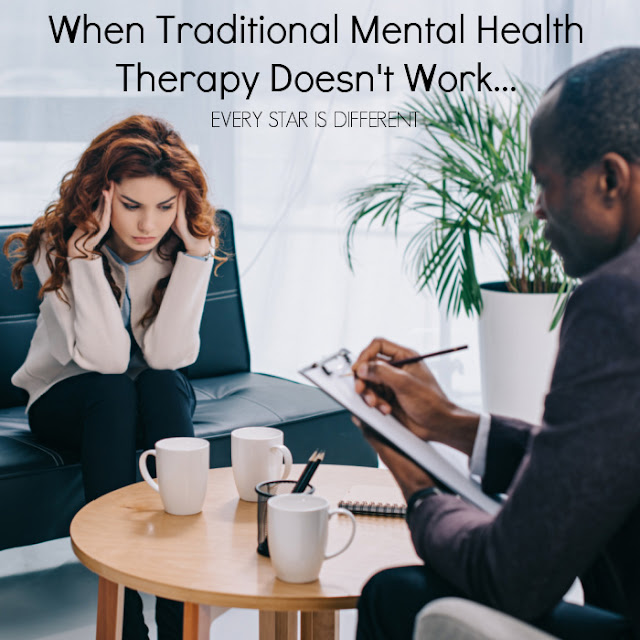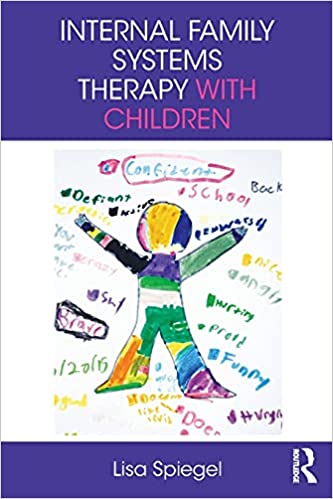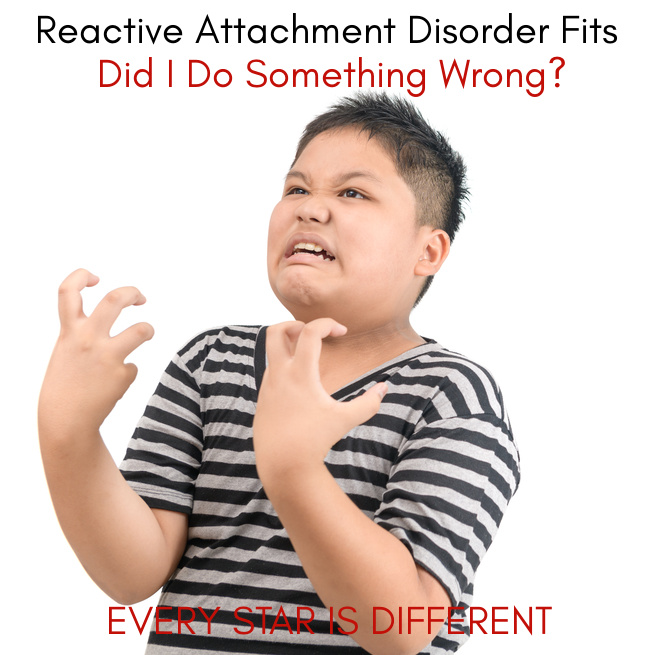Mental health therapy and I aren't the closest of friends. If I'm being completely honest, we're not even acquaintances.
Throughout my many years of life I have seen mental health therapy manipulated to benefit those in power.
I have experienced being on the receiving end of services where the mental health professional caused more harm than good.
I have worked with many mental health professionals who feel that a child's behaviors is the fault of the parents, and therefore the parents need to be "fixed."
And when it's come to Sunshine, I have worked with so many mental health professionals who think they know how to help, don't listen to our experiences as parents or experiences we've had with other professionals, and then when their way doesn't work, they give up and Sunshine gets burned again.
It can be extremely frustrating when traditional mental health therapy doesn't work, especially after hoping it would so many times.
Therapy for those Who Have Experienced Trauma
It's been a little over a year since I started working with a therapist who specializes in trauma for myself.
Taking that leap of faith, after so many negative experiences, was HARD. If you'd like to know just how difficult it was, I wrote about my first session HERE.
Traditional mental health therapy models were definitely not a great fit for me, after so many prior experiences that were negative.
I was so thankful that the therapist I met with was well versed in many modalities and was willing to put the hard work and effort into finding the perfect fit for me.
She recommended we start with the book, The Body Keeps the Score. This book introduces many types of therapies that may work for people who have experienced trauma.
Originally I was hoping to try EMDR or something similar, but after reading the book mentioned above, I found IFS or Internal Family Systems model to be the most intriguing.
Fortunately for me, my therapist was trained in the model and more than willing to try it out!
What is IFS?
Internal Family Systems or IFS is a therapy that emphasizes the idea that we all have multiple parts.
Each part plays a role in how we respond to the world around us.
Parts develop as we experience trauma, as ways to survive and cope with the situations we are placed in.
Some of these parts are protective.
Others like to act as managers.
We have parts that have been exiled.
Not all parts get along.
And when the parts don't work correctly, it's as if a fire has broken out, and firefighters are called in to respond.
IFS focuses on identifying and working with parts to help an individual understand their own trauma response and how it works.
From there, the individual self works with the parts to develop a plan for the future that is more balanced and healthy, with all parts better understanding their role in the present, which may differ from the past.
Eventually the exiles are unburdened and the self is able to take the lead, with the parts understanding and loving their present roles in helping the individual remain as healthy as possible.
Thinking of One's Self in Parts
IFS may seem odd at first, but if you pause for a moment and think about how you talk about your feelings, it makes so much sense.
How often do you say,
"Well, part of me feels this way, while another part of me feels this way."
IFS just takes things further, by naming and identifying parts and working with them to help you be the best you can be, while fully respecting each and every part.
I can say for me, understanding all of my parts has been life changing.
Giving each part a name has provided such comfort.
So much power comes from understanding all of my parts and how they work.
I am a healthier and happier person.
IFS for the Individual
Due to my struggles with trusting mental health therapists and any modality, once I showed interest in IFS, my therapist recommended reading Internal Family Systems Therapy by Richard C. Schwartz.
This book is not light reading, but actually a text used to train therapists how to do IFS.
Each week I'd read a little bit and bring questions to therapy.
At the same time, each session, my therapist would help me with my individual IFS work.
Words can not express how amazing this journey has been and how much it has helped me.
I highly recommend it for anyone who's looking for a new way to work through trauma. I will be continuing for as long as my therapist welcomes me back!
Now that I've finished the text one time through, I have slowly started to work through the corresponding workbook, Internal Families Systems Skills Training Manual as I read the original text a second time through.
Who can benefit from IFS?
IFS was can and has been used in a variety of cases ranging from trauma to addictions, to personality disorders.
As much as some of my parts continue to try to convince me that I am wrong, bad, and not okay, my therapist, and many before her, have stated that I don't suffer from an anxiety disorder, depression, PTSD, ADHD, or anything else.
My anxiety is not severe or inhibiting.
I am not a depressed person.
Yes, I have experienced trauma, but it can't be considered POST traumatic stress disorder, if I'm still going through it, which I am, in regards to Sunshine's situation.
I do not have ADHD, even though my trauma response feels like ADHD on steroids. But unlike ADHD, it comes with a fog that takes over.
I don't have a personality disorder.
I don't suffer from addictions.
Yet, IFS is perfect for me because it helps me work through my body's response to trauma from the past and present, and fears of what may happen in the future.
IFS for Couples
Trauma doesn't just affect individuals in family. It affects the marriage and family dynamics.
My husband and I have attempted couples therapy for the last three months, without using the IFS model.
It has not gone well and is extremely triggering.
Due to these struggles with traditional couples therapy approaches, and our love of IFS, we've decided to switch modalities and use the Internal Family Systems Couple Therapy Skills Manual.
My therapist, trained in IFS, has agreed to help us with anything we may have questions about.
IFS for Children
One of the greatest benefits of IFS therapy and training has been how I've been able to apply it to situations at home with my kids, especially Princess.
She is very quick to view herself as ALL bad, when in fact, it is only parts of her that feel that way.
Understanding her many parts has been eye opening and empowering for her.
When it comes to tense situations between us, instead of conversations becoming heated, all I have to do is ask Princess, what part is in charge right now, and she calms right down.
The part is then free to express feelings without judgement, and we work to help her part(s) feel safe.
Princess has gone as far as drawing images of her parts, what they look like, and how they work.
She absolutely loves this modality. Unlike others we've tried, this one is actually working.
I am super excited to start using the Internal Family Systems Therapy with Children book to help guide Princess' progress.
IFS has not been offered at any of Sunshine's residential placements, but if it was, I believe it would also help her.
Try It!
My husband was laughing at me today as I expressed my love for IFS. He knows more than anyone how much I dislike mental health therapy, especially many of the traditional modalities.
He worked as a mental health therapist and has tried for years to persuade me of the benefits of mental health therapy, despite what I've experienced in the past, and what our family has endured over the years.
Today he declared victory, even though I told him, I was only in support of IFS.
If you're struggling with traditional mental health therapy and feel it's not working, research local IFS trained therapists in your area and try it.
IFS is a complicated approach, so I can't emphasize enough how important is to work with a therapist who has training and experience with it.
It may just change your life for the better!
To receive more mental health resources and support from us, be sure to subscribe to our FREE newsletter.
Click HERE to Subscribe to our FREE Newsletter
If you enjoyed this post, you may also enjoy the resources below.













